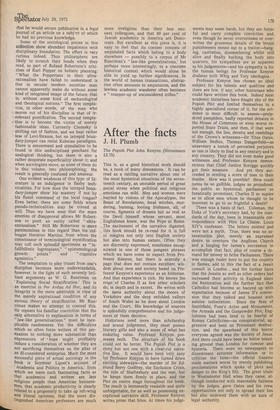After the facts
J. H. Plumb
The Popish Plot John Kenyon (Heinemann £3.75) This is, as a good historical work should be, a book of many dimensions. It can be read as a rattling narrative about one of the most hysterical situations of the seventeenth century, an unstable period of great social stress when political and religious emotions ran wild. Men and women were harried by visions of the Apocalypse, the Beast of Revelations, local witches, murdering, burning, looting Irishmen, all, of course, figments of dreams but as real as the Devil himself whose servant, most Englishmen knew, was the Pope at Rome. The excitement of the narrative digested, this book should be re-read for it is full of insights not only into English society but also into human nature. Often they are discreetly expressed, sometimes encapsulated in one of those pungent phrases which we have come to expect from Professor Kenyon, but there is scarcely a page that does not contain excellent wisdom about men and society based on Professor Kenyon's experience as an historian. And that experience is rich. He knows the reign of Charles II as few other scholars do; in depth and in extent. He writes with the same authority about the moors of Yorkshire and the deep enfolded valleys of South Wales as he does about London and the Court. His knowledge of sources is splendidly comprehensive and his judgement of them decisive.
Historians need more than scholarship and sound judgement, they must posses literary gifts and also a sense of what has enduring value. Professor Kenyon possesses both. The structure , of his book could not be better. The Popish Plot is a story but not one with a clear-cut narrative line. It would have been very easy for Professor Kenyon to have turned down exciting sideways—the murder of Sir Edmund Berry Godfrey, the Exclusion Crisis, the role of Shaftesbury and the rest, but he keeps them firmly in place, and the Plot on centre stage throughout the book. The result is immensely readable and quite unforgettable, for as well as possessing exceptional narrative skill, Professor Kenyon writes prose that bites. At times his judge
ments may seem harsh, but they are forceful and carry complete conviction and, even though he never overstresses or overwrites the gruesome details of the brutal punishments meted out to a traitor—hanging, castration, dismembering whilst still alive and finally hacking the body into quarters, his sympathies are as apparent as his judgements—and his sympathy is for the human beings for Professor Kenyon disdains both Whig and Tory ideologies.
Professor Kenyon has chosen an ideal subject for his talents and qualities and there are few, if any, other historians who could have written this book. Indeed most academic historians have fought shy of the Popish Plot and limited themselves to a highly specialised corner of it, for the evidence is most difficult to assess—prejudiced pamphlets, badly reported debates in the House of Commons or even worse reported State Trials, and then, if that were not enough, the lies, deceits and ramblings of the Crown's witnesses—Dr Titus Oates, William Bedloe, Thomas Dangerfield—as unsavoury a bunch of perverted perjurors as one is likely to find in any century and in any country. They did not even make good witnesses and Professor Kenyon demonstrates that Chief Justice Scroggs quickly
got their measure. And yet they succeeded in sending a score of men to their deaths. How was it possible? How could juries be so gullible, judges so prejudiced, the public so hysterical, parliament so fanatically protestant, Charles II so supine as to allow men whom he thought to be innocent to go to so frightful a death?
There was a basis of fact. Coleman, the Duke of York's secretary had, by the standards of the day, been in treasonable correspondence with Pere La Chaise, Louis XIV's confessor. The letters existed and were not a myth. True, there was no assassination plot, merely an expressed desire to overturn the Anglican Church and a longing for James's succession to accomplish that fact, plus of course a demand for money to bribe Parliament. There was enough tinder here to put the country in flames; add to this the fact of a Jesuit consult in London , and the further facts that the Jesuits as well as other orders had increased their activity in England since the Restoration and the further fact that Catholics had become so buoyed up with expectation because of James II's conversion that they talked and boasted with asinine indiscretion. Since the fires of Smithfield, Foxe's Actes and Monuments, the Armada and the Gunpowder Plot, Englishmen had been bred to be fearful of Roman Catholicism—as conspiratorial, aggressive and bent on Protestant destruction, and the spearhead of this horror everyone agreed was the Society of Jesus. And there could have been no better breeding ground than London for rumour and hysteria. There were no newspapers to disseminate accurate information or to criticise the false—the official Gazette made matters worse by merely publishing proclamations which spoke of plots and danger to the King's life. The great trials in Westminster Hall when they came, although conducted with reasonable fairness by the judges, gave Oates and his crew opportunities not only to spread their lies but also endowed them with an aura of legal authority.








































 Previous page
Previous page